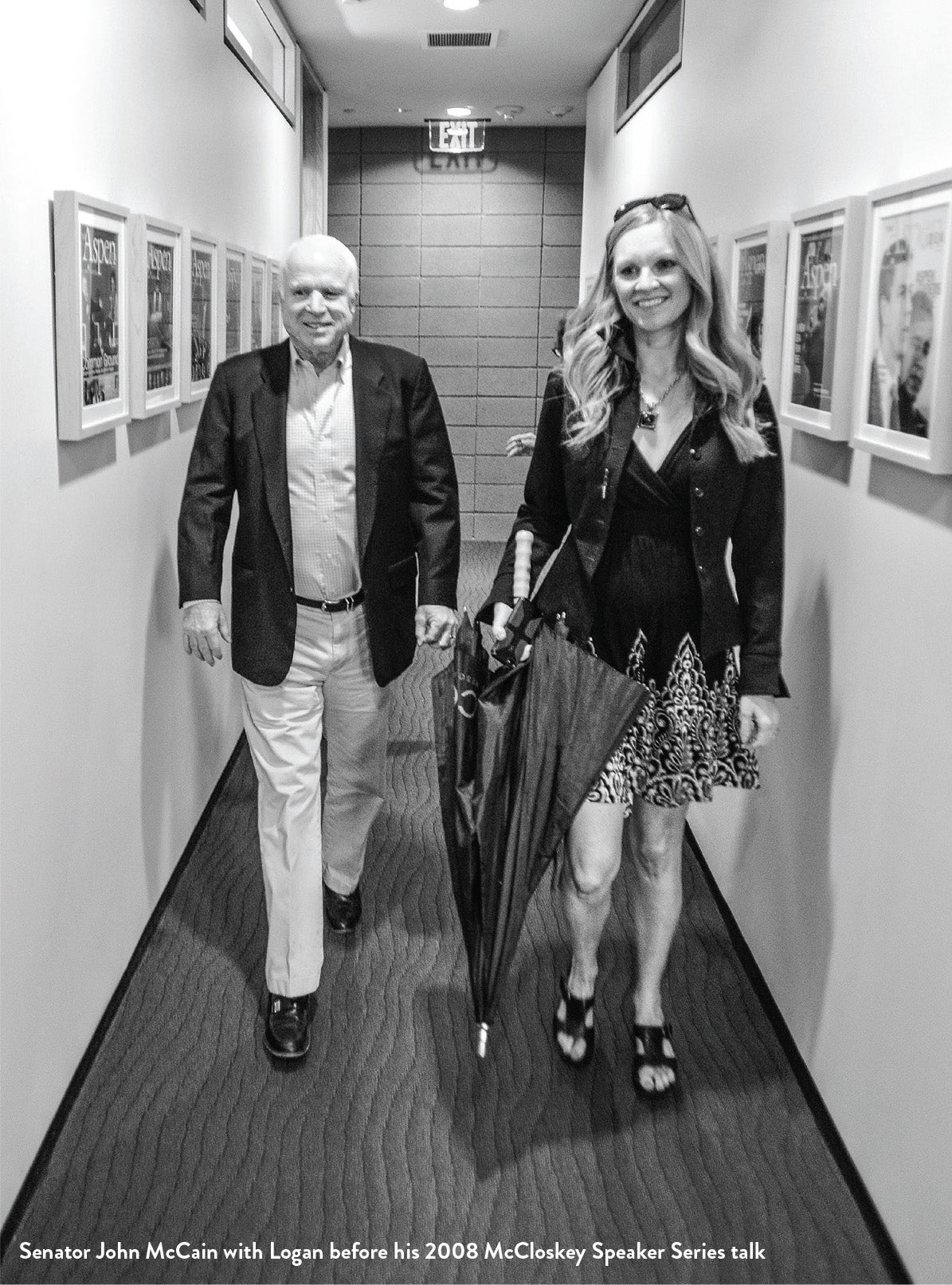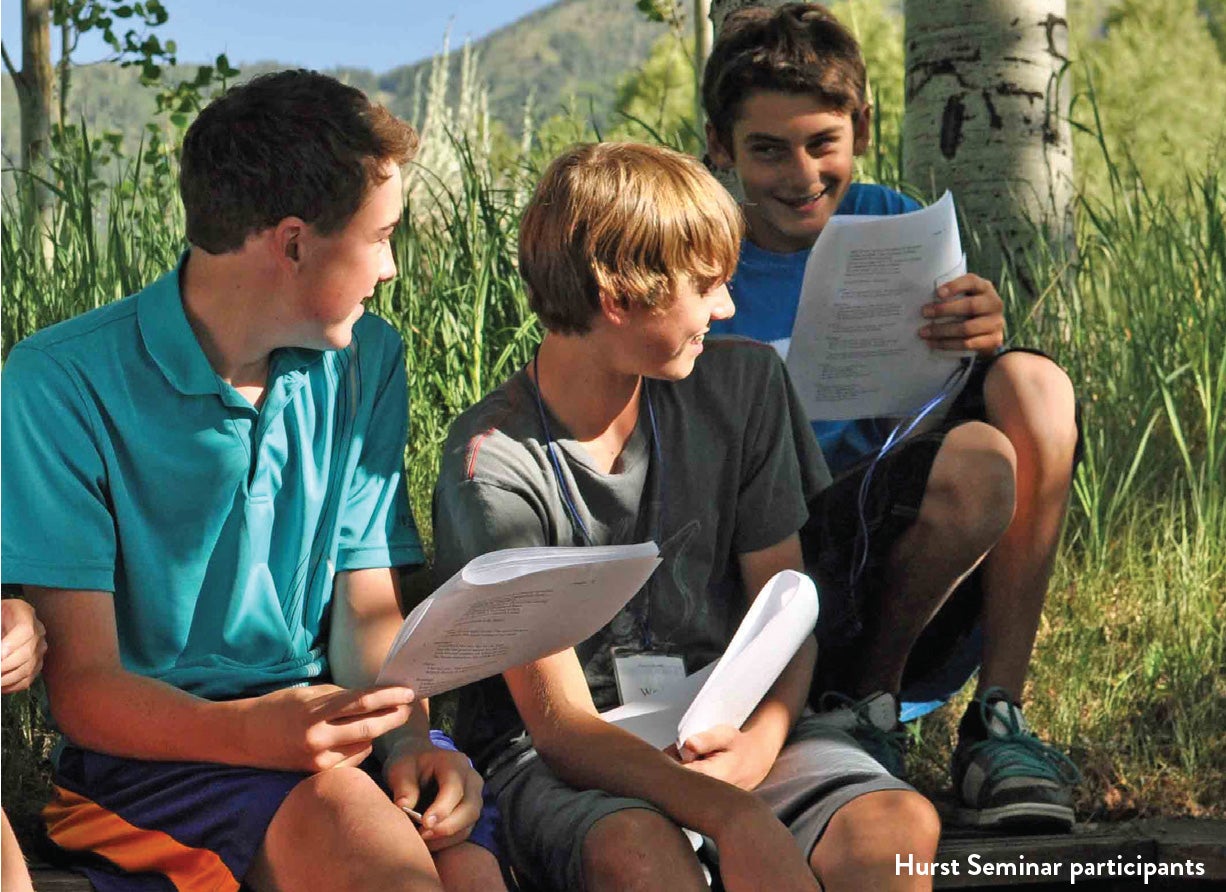Over eight months in 1999, a crime spree swept through Aspen, Colorado, a city where residents normally feel so safe they don’t lock their doors. Several armed robberies, including a pistol-whipping during one holdup, horrified the community, which was even more shocked when it came to light that a dozen local teenagers were the perpetrators. How a mountain town known for producing athletes, high achievers, and service-oriented individuals could come to this point was hard to fathom.
In the crime spree’s aftermath, the Aspen Institute hosted a community roundtable to explore the roots of the issue and next steps. The Institute invited school representatives, law-enforcement officials, community leaders, local parents, and teens. The event by itself may not be widely remembered for producing any pat answers, but from it emerged some enduring programs that have given the Aspen community a platform for valuable discussion, introspection, and critical thinking.
This year, Aspen Community Programs celebrates its 20th year offering public programs to local residents and visitors. It has grown from approximately 19 days of programming during its first year to around 70 days today. Community Programs has added events, occasionally dropped some, and adapted others to the area’s needs. Today, its initiatives serve a broad swath of the Aspen community—from middle-school students to local leaders to the public at large—through wellestablished scholarships and reputations.
“The common theme and our mission is to provide a place where locals can come together to discuss timely, relevant issues with their fellow citizens,” says Cristal Logan, an Institute vice president and the director of Aspen Community Programs. “It’s a way of learning, stimulating your mind, and meeting other people—who may be likeminded or you might disagree with—and having a neutral place to do it.”
Starting a Local Conversation
 Aspen Community Programs started very deliberately. The Institute itself was founded in 1949 and was long considered a haven for business executives and policymakers who would jet in and out of town for private programs. The Institute’s flagship program, the Executive Seminar, was in fact geared toward those kinds of leaders, who used text-based Socratic dialogue to explore societal values—and thus develop into more self-aware and better leaders.
Aspen Community Programs started very deliberately. The Institute itself was founded in 1949 and was long considered a haven for business executives and policymakers who would jet in and out of town for private programs. The Institute’s flagship program, the Executive Seminar, was in fact geared toward those kinds of leaders, who used text-based Socratic dialogue to explore societal values—and thus develop into more self-aware and better leaders.
“Because we weren’t a public-facing organization, we got the reputation of being private and elitist,” explains Logan. At one point, the friction between the local community and the Institute became so acute that the organization nearly left its founding location.
It was in this atmosphere that the Institute hired John Bennett, then the outgoing mayor of Aspen, as the first director of Aspen Community Programs in 1999. He and Logan, whom he hired almost immediately, were charged with creating yearround programming specifically for locals.
The pair was exploring collaborations with local organizations when the crime spree steered them down the path of a youth-focused program. Bennett met Bill Cathers, who had long before worked with Executive Seminar designer Mortimer Adler and had even adapted the seminar for high-school students elsewhere. Cathers helped Bennett and Logan put together a curriculum for a local school seminar.
“When you’re in a room with people for four days, you’re engaged in real conversation that’s regrettably absent in our increasingly polarized society,” says Lee Bycel, a senior seminar moderator at the Institute. “No one’s grading you, so you can take risks on what you’re thinking. What kids get out of it is that life is not just college, a job, and who you live your life with. There’s value in looking at life, what it means to be human and to feel.” Youth programs have grown, with a Great Ideas seminar added for eighth-graders. In both that and the high-school version, school representatives select the participants. Teen Socrates, open to anyone ages 15 to 17, rounds out the youth offerings.
The high-school Great Ideas seminar was such a hit with students—Bennett recalls hearing it was transformational for some—that parents began asking if they could take part. Thus, the Community Great Ideas Seminar was born. Over the years, other multiday public seminars, all based on reading classic texts and a roundtable format that equalizes participants, were developed or taken over from local groups. Great Books and Great Decisions explore significant Western books and key foreign-policy issues, respectively. In Sharing Shakespeare, a program Logan launched in 2004 with a group of locals, participants dissect relevant political and social themes in Shakespeare’s plays. It attracted 100 people in just its initial offering. Community Programs developed its newest public seminar, Our Society Imagined, from scratch to explore domestic policy. “We try to create different ways the community can take part in programming that’s relevant and stimulating to them,” Logan says.
The public seminar programs are part of what makes the Aspen area unique, says Parker Maddux, who retired to Basalt with his wife after living around the world. Even in cosmopolitan cities, similar programming might exist but is usually associated with a university. Aspen, on the other hand, “attracts people with vast experiences and a sensitivity to the problems we all face,” says Maddux, who occasionally moderates seminar programs. Participating in them is important mental exercise, he says. And Maddux is lobbying to expand Aspen Community Programs, so it has greater reach. “I think there’s a hunger for these types of programs,” he says. “Ideas pop up, and unexpected comments allow you to see things differently.”

Expanding the Conversation
When they launched Aspen Community Programs in 1999, Bennett and Logan inherited a summer series featuring six lectures by speakers who were already in town for other Institute events. “There was a wealth of people always coming through, and we wanted to share them with the community,” Logan says. Three summer speaker series may get less fanfare than the flagship Aspen Ideas Festival, but they bring in equally impressive leaders, thinkers, and innovators: the Hurst Lecture Series, the McCloskey Speaker Series, and, reflecting the Institute’s founding philosophy, the Murdock Mind, Body, Spirit Series, endowed by Institute trustee Jerry Murdock’s wife, Gina Murdock.
Rachel Richards, who was Aspen’s mayor immediately after Bennett, recalls the Institute’s community engagement expanding as Aspen Community Programs grew. “It was a larger invitation to everyone, that they were trying to make these incredible guest speakers and enlightening programs available to everyone at a really affordable rate,” she says, noting in particular the ticketed public events that take place during the Aspen Ideas Festival. The Institute “has done a lot,” Richards says, “to integrate the whole concept of the Aspen Idea at a time when we really needed it.”
 As the names of the speaker series suggest, they require generous support to be sustainable. “We struggled for years to raise money for these programs,” Logan says. Fortunately, Aspen Community Programs has a few long-standing donors who have helped keep programs affordable and accessible. These contributions have also funded needbased scholarships for teens and adults. Bonnie and Tom McCloskey stepped up in 2005 to endow a summer speaker series, and in 2012, local residents Bob and Soledad Hurst gave an endowment to support a high-school and middleschool Great Ideas program as well as the Hurst Lecture Series. “We live in Aspen full time and believe it’s critical that programs are available and grounded in the community,” Bob Hurst says. “It is part of the history of the Institute.”
As the names of the speaker series suggest, they require generous support to be sustainable. “We struggled for years to raise money for these programs,” Logan says. Fortunately, Aspen Community Programs has a few long-standing donors who have helped keep programs affordable and accessible. These contributions have also funded needbased scholarships for teens and adults. Bonnie and Tom McCloskey stepped up in 2005 to endow a summer speaker series, and in 2012, local residents Bob and Soledad Hurst gave an endowment to support a high-school and middleschool Great Ideas program as well as the Hurst Lecture Series. “We live in Aspen full time and believe it’s critical that programs are available and grounded in the community,” Bob Hurst says. “It is part of the history of the Institute.”
Another branch of the Aspen Community Programs tree helps local leaders grapple with local issues. These occasional forums have studied topics such as housing, broadband, and mental health, and recently the forum met to try to find solutions to the area’s traffic issues. As a result of 15 months of meetings and public events, the task force for the traffic forum published a report with recommendations that the regional transportation committee is currently following.
What the Institute brought to the table, says Pitkin County Manager Jon Peacock, who has been a moderator as well as a participant in Aspen Community Programs, were experts with outside experience and innovative viewpoints. “Local communities are consistently challenged to consider issues holistically, bringing the increased polarization in our communities into sharper relief and making implementation more difficult,” Peacock says. “The Institute has a tested model to convene productive conversations between people and groups with different values. It can and does provide great value to local communities dealing with difficult questions.”
“The Aspen Institute is such an amazingly valuable resource, and the community for several decades really had not been able to take advantage of that,” Bennett says. “It’s a great pleasure to see the organization as open as it is today. Community Programs deepen the connection between the Institute and the Aspen community.”